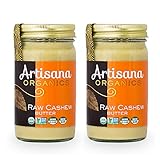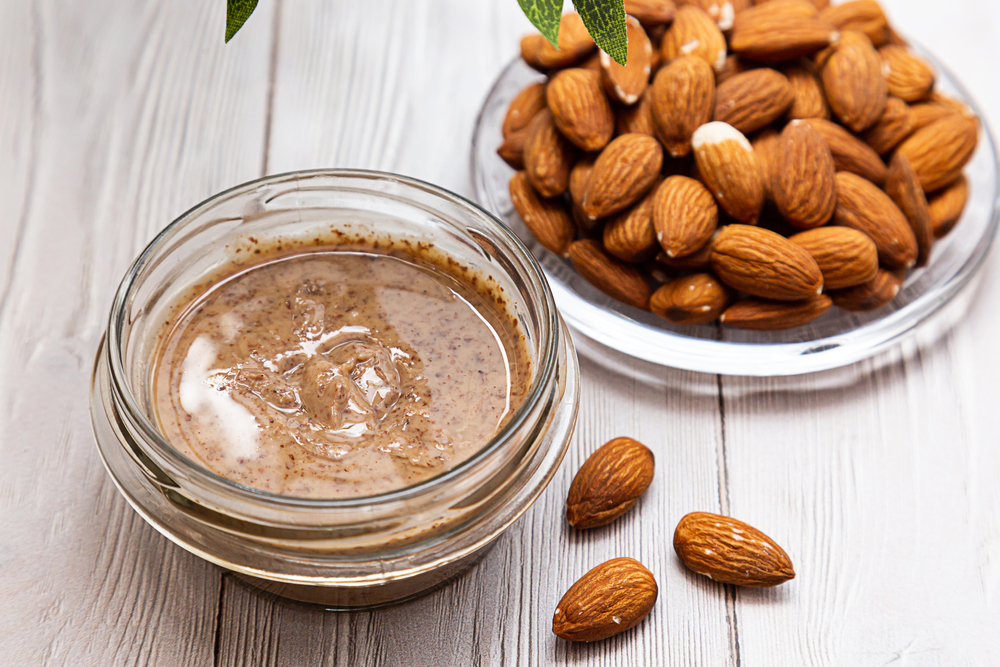Almond butter is a type of nut butter made from almond paste and oil, which can be stored in the fridge or at room temperature. Almond butter has a sweet taste due to its sugar content. It also contains calcium, magnesium, vitamin E, and manganese. The consistency of almond butter varies depending on how much water was added during processing. So, does almond butter go bad?
Almond butter may go rancid. An unopened jar should be good for around six months after the expiration date. It will last even longer if kept in the fridge, up to a full year after the expiration date. An opened almond butter will stay fresh for 3 to 5 months when stored at room temperature and 9 months when refrigerated.
In this article, we’ll discuss whether almond butter goes bad over time, as well as how to properly store almond butter. We will also highlight a few alternatives. Let’s dig in!
Contents
- Does Almond Butter Go Bad Over Time?
- Does Almond Butter Need To Be Refrigerated?
- How Can You Tell If Almond Butter Has Gone Bad?
- How to Properly Store Almond Butter
- Does Almond Butter Go Bad After Opening?
- Can You Get Sick From Old Almond Butter?
- Does Almond Butter Have Dairy?
- Alternatives to Almond Butter
- Related Questions
Does Almond Butter Go Bad Over Time?
Like other nut butter and nut pastes, Almond butter can last much longer than what is stated on the label. Naturally, almond butter may last longer than what is printed on the label; however, how long it lasts depends on whether it has been opened or not. Unopened almond butter in the pantry should keep for approximately six months after its expiration date has passed, while refrigerated almond butter will keep for a year. The container should last 3-5 months in the pantry and 6-9 months if refrigerated once opened. Always smell it or give it a tiny taste before serving to verify that it’s still fresh and hasn’t gone rancid.
Does Almond Butter Need To Be Refrigerated?
While it isn’t mandatory, almond butter contains a lot of oil, so you will typically store it in the fridge. However, you can choose to keep it at room temperature if you prefer. Just be sure to keep an eye on the expiration date, so you know when it’s time to toss it.
How Can You Tell If Almond Butter Has Gone Bad?
Almonds are susceptible to rancidity, which occurs when they are exposed to light, heat, and oxygen because of the unsaturated fat in them. As a result, keeping your almond butter in the fridge may help prevent it from becoming rancid. If you’re not sure if your almond butter is still good, there are a few ways to tell if it’s rancid:
The easiest method to tell if your almond butter has gone rancid is by sniffing it. If it doesn’t smell right, it’s a good indicator that the product has begun to spoil. The odor of the container might be somewhat acidic or even have a paint-like scent.
Another option is to try it out by tasting it. If the liquid tastes bad in any way or reminds you of paint, then it’s probably rancid and should be tossed away.
If mold appears in the jar after you open it, your almond butter is no longer good and should be disposed of.
How to Properly Store Almond Butter
- The best way to store almond butter is in an airtight container in the fridge. This will help keep it fresh for up to three months.
- If you have opened the almond butter, it will last for up to two weeks in the fridge.
- You can also store almond butter in the freezer for up to six months.
- It is possible to store almond butter at room temperature for up to six months; however, the oil may begin to separate from the paste if you go longer than that.
Does Almond Butter Go In The Fridge?
Whether or not you should put almond butter in your fridge depends on what kind of consistency you enjoy the most. If the oil separates from the paste, leaving a watery mess on top, it is best to keep it in the refrigerator. However, if you don’t care about that happening and prefer a spreadable consistency, then room temperature is fine.
Does Almond Butter go bad at room temperature?
Again, this depends on your preference. If you would like to store it at room temperature for an extended period, make sure to keep an eye out for any changes in consistency or smell, as both could be indicative of the almond butter going bad. Otherwise, the fridge is an excellent place to keep it to prevent spoilage.
Does Almond Butter Go Bad After Opening?
Yes, almond butter can go bad if opened. However, it will last longer than if it were unopened. If you keep it in the fridge, it will be good for a few months. It won’t last quite as long if you leave it out on the counter.
Can You Get Sick From Old Almond Butter?
It is not likely that you will get sick from eating old almond butter. The oil and paste do not contain any ingredients that could go bad, such as dairy or meat products. However, there is a chance that the almond butter may develop harmful bacteria due to improper storage after it has been opened. This can cause food poisoning if you eat both the almond butter and its harmful bacteria.
If you want to eat old almond butter, just make sure it has been stored properly after being opened. If there are any changes in smell or consistency, discard the paste instead of putting yourself at risk for illness.
Does Almond Butter Have Dairy?
No, almond butter does not have dairy. Almond butter should have no additives or artificial ingredients, meaning that ground almonds and oil are the only things in it. Some almond butter has dairy because they are made with almond and cashew butter, but pure almond butter will not have dairy. Make sure you check the label if this is of concern to you. All of its ingredients are plant-based, so it is an excellent option for lactose intolerant or having other food allergies. It is also high in protein and healthy fats, making it a nutritious choice for any meal.
Alternatives to Almond Butter
If you are looking for an alternative to almond butter because of concerns about allergies or other ingredients, many alternatives are available. Nut butter made from peanuts, sunflower seeds, pecans, walnuts, and cashews are all great options. These can be found in the grocery store near the almond butter or at a health food store that carries a wider variety of these products.
Sunbutter Natural Sunflower Seed Spread
 Along with being peanut-free, SunButter Natural Sunflower Seed Spread is gluten-free and free of tree nuts. Vitamin E and fiber are provided by SunButter. SunButter is a delicious alternative to peanut butter that comes from specially selected sunflower seeds. SunButter is produced in the United States and processed in a facility that does not use peanuts or tree nuts.
Along with being peanut-free, SunButter Natural Sunflower Seed Spread is gluten-free and free of tree nuts. Vitamin E and fiber are provided by SunButter. SunButter is a delicious alternative to peanut butter that comes from specially selected sunflower seeds. SunButter is produced in the United States and processed in a facility that does not use peanuts or tree nuts.
Teddie All Natural Peanut Butter
 Teddie peanut butter is made from 100% peanuts and a bit of salt. No oil or sugar is added to this peanut butter, making it a great alternative to almond butter.
Teddie peanut butter is made from 100% peanuts and a bit of salt. No oil or sugar is added to this peanut butter, making it a great alternative to almond butter.
Artisana Organics Raw Cashew Butter
 Cashew Butter this is creamy and has a slightly sweet flavor. It is a good source of magnesium and zinc. Artisana’s Cashew butter uses only cashews and is made is small batches with organic cashews.
Cashew Butter this is creamy and has a slightly sweet flavor. It is a good source of magnesium and zinc. Artisana’s Cashew butter uses only cashews and is made is small batches with organic cashews.
Sun & Seed – Raw Organic Walnut Butter
 Walnut butter is high in omega-3 fatty acids, which are beneficial for the heart and brain. It also has a rich, earthy flavor. Sun and Seed’s walnut butter is ethically sourced and has 16g of protein per serving.
Walnut butter is high in omega-3 fatty acids, which are beneficial for the heart and brain. It also has a rich, earthy flavor. Sun and Seed’s walnut butter is ethically sourced and has 16g of protein per serving.
Jiva Organics RAW SPROUTED Organic Pumpkin Seed Butter
 Pumpkin Seed Butter is a less common alternative. This brand uses only pumpkin seeds ground at 108 degrees to create a great tasting nut butter. The butter is enzyme rich, high in iron and easy to digest.
Pumpkin Seed Butter is a less common alternative. This brand uses only pumpkin seeds ground at 108 degrees to create a great tasting nut butter. The butter is enzyme rich, high in iron and easy to digest.
Purely Pecans Nut Butter
 Pecan butter has an almost syrupy texture and is high in nutrients like vitamin E. Purely Pecans
Pecan butter has an almost syrupy texture and is high in nutrients like vitamin E. Purely Pecans
is Gluten-Free, Non-GMO, Keto, Paleo, Kosher, and Vegan
Vör Pure Hazelnut Butter Spread
 Hazelnut butter has a robust flavor and is more subtle than almond butter. Its texture is smooth and creamy. This brand is made from 100% hazelnuts and no added ingredients.
Hazelnut butter has a robust flavor and is more subtle than almond butter. Its texture is smooth and creamy. This brand is made from 100% hazelnuts and no added ingredients.
Related Questions
What Are The Benefits Of Almond Butter?
Almond butter is a type of nut butter made from ground almonds. It has a sweet, rich flavor with a slight hint of citrus. Almond butter is high in fiber and vitamin E, and it also contains antioxidants that can help protect the body against disease. Additionally, almond butter is a good source of protein. Almond butter is vegan and gluten-free.
How Different Does Almond Butter Taste From Peanut Butter?
Almond butter tastes significantly different from peanut butter. Peanut butter is made from ground roasted peanuts, while almond butter is made from ground almonds. Almond butter has a more subtle flavor than peanut butter and a smoother texture.
Can I Eat Almond Butter if I have a Peanut Allergy?
Almond butter is made from almonds instead of peanuts, so it does not contain any proteins that can cause an allergic reaction. This makes almond butter a safe choice for people with peanut allergies. However, anyone with a nut allergy should always check the ingredients list to make sure there are no other allergens present.
